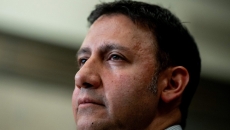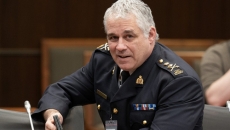Federal and provincial immigration ministers will converge in Montreal Friday to puzzle out how to shrink the number of temporary residents in Canada while maintaining economic growth and the integrity of the overall system.
Immigration Minister Marc Miller is expected to meet with his provincial and territorial counterparts in person for the first time since he announced an unprecedented plan to set limits on the number of new temporary residents.
The aim is to rein in the runaway growth by decreasing the number of temporary residents over the next three years to five per cent of Canada's population, down from the 6.2 per cent it was in 2023.
The new targets will be developed over the summer after the provinces and territories have had a chance to weigh in.
Already Miller has announced plans to scale back the number of international students by putting a two-year cap on new admissions in January.
The government is also attempting to speed up the time it takes to process asylum claims and, in the recent federal budget, included legislative measures designed to make the deportation process faster when those claims are denied.
The final and largest category that has yet to be addressed is temporary work permit-holders.
A major focus for the ministers will be negotiating how to allocate a finite number of temporary visas, now that employers have come to rely on a limitless number of temporary workers.
In 2018, there were 337,460 people with temporary work visas. By 2022, that number swelled to 605,851.
Miller has said it's a workforce the labour market has become addicted to in recent years.
Like breaking with any addiction, there are sure to be ups and downs.
In Manitoba, for example, announcements out of Ottawa about scaling back temporary immigration have been met with an overwhelming surge in applications to the provincial nominee program for permanent residency.
Earlier this week, Miller agreed to Manitoba's request to extend the federal work permits for some 6,700 newcomers whose visas were set to expire by the end of the year, to give them time to apply to stay in Canada permanently.
The new temporary visa target will also significantly slow population growth. While that could ease some pressure on housing costs and availability, it could also result in worker shortages, said Andrew Grantham, an executive director at CIBC Economics, in a report published last month.
"Restrictions on population growth could result in companies having to offer higher wages to encourage persons to remain in, or rejoin, the workforce. We could lose some firms that are simply not profitable if they are unable to tap low paid foreign workers," Grantham said.
The labour needs of each province are expected to factor heavily into Friday's discussions, but labour economist Mikal Skuterud said work visas shouldn't be considered in isolation.
"You can't do that, it's part of the whole system," said Skuterud, an economist with the University of Waterloo.
He was among the first to warn the government to temper the massive rise in people who migrate to Canada on a temporary basis to work or study.
Skuterud credits that increase to changes to the criteria for permanent residents, which were designed to fill specific labour gaps. Those changes have created an incentive for lower-skilled workers to come to Canada in hopes of getting permanent residency.
"That's what's luring huge numbers to come, and it's creating this problem in the (non-permanent resident) population," he said.
That can make students and workers vulnerable to predatory practices by some recruiters, consultants and employers who can profit off their precarious status in Canada, he said.
He suggests the problem could be reversed by creating a more predictable and transparent path to permanent residency for newcomers.
The new targets for temporary visas will be published in the fall.
Images courtesy of "The Canadian Press"






